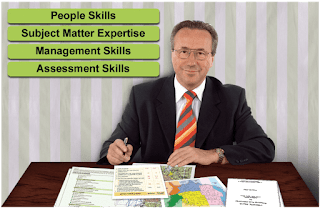Teaching is to instruct or train. Teachers often complete some type of formal training, have specialized knowledge, have been certified or validated in some way, and adhere to a set of standards of performance. Defining a “good instructor” has proven more elusive, but in The Essence of Good Teaching (1985), psychologist Stanford C. Ericksen wrote “good teachers select and organize worthwhile course material, lead learners to encode and integrate this material in memorable form, ensure competence in the procedures and methods of a discipline, sustain intellectual curiosity, and promote how to learn independently.”
Process
The teaching process organizes the material an instructor wishes to teach in such a way that the learner can understand it. The teaching process consists of four steps: preparation, presentation, application, and assessment. Regardless of the teaching or training delivery method used, the overall sequence remains the same. Much research has been devoted to trying to discover what makes an effective instructor. This research has revealed that effective instructors come in many forms, but they know how to process four essential teaching steps mentioned above. [Figure 1]
 |
| Figure 1. Aviation instructors organize course material and use procedures and methods that promote learning |
The remainder of this site explores the qualities of effective teachers and the methods used for preparing, presenting applying, and assessing lesson material and covers various delivery methods in depth.
Essential Teaching Skills
Four essential skills good teachers have include:
- People skills
- Subject matter expertise
- Assessment skills
- Management skills
People Skills
Effective instructors relate well to people. Effective communication, discussed earlier, underlies people skills. It is important for instructors to remember:
- Technical knowledge is useless if the instructor fails to communicate it effectively.
- The two-way process of effective communication includes actively listening to the learner.
In the previous scenario, Bob uses the guided group discussion period to listen to his learners discuss the weight and balance problem. By listening to their discussion and questions, he can pinpoint problem areas and explain them more fully during the review of the solved problem.
People skills also include the ability to interact respectfully, pick up when learners are not following along, provide motivation, and adapt to the needs of the learner when necessary. Another important people skill used by effective instructors is to challenge learners intellectually while supporting their efforts. Effective instructors also display enthusiasm for their subject matter and express themselves clearly.
Subject Matter Expertise
A subject matter expert (SME) is a person who possesses a high level of expertise, knowledge, or skill in a particular area. For example, the instructor in the opening scenario is an aviation maintenance SME.
Effective instructors have a sincere interest in learning and professional growth. There are a number of professional development opportunities for aviation instructors, such as Federal Aviation Administration (FAA) seminars, industry conventions, professional organizations, and online classes. Networking with and observing other instructors and seeking mentoring from an experienced instructor to learn new strategies is also helpful. By being a lifelong learner, the aviation professional remains current in both aviation and education. This topic is explored more thoroughly in the section titled Professional Development found within this site.
Management Skills
Management skills generally include the ability to plan, organize, lead, and supervise. For the effective instructor, this translates into being able to plan, organize, and carry out a lesson. A well-planned lesson means the instructor is also practicing time management skills and ensures the time allocated for the lesson is used effectively.
To manage time well, it is important that an instructor plans how to use the time to achieve the lesson goals. This includes time for what needs to be done as well as time to handle the unexpected. It minimizes stress by not planning too much for the allotted time.
Time management also come into play for the aviation instructor who is teaching a class. Consider the opening scenario in which Bob arrived early for the class and ensured the classroom was ready by completing a series of tasks.
Another management skill that enhances the effectiveness of aviation instructors is supervision of the learners. For the flight instructor, this may entail overseeing the preflight procedures. For the maintenance instructor, this may mean monitoring a maintenance procedure. While it is important to provide hands-on tasks in the lesson plan to engage learners, it is also important to ensure the learners complete the tasks correctly.
Assessment Skills
In The Learning Process, learning was defined as a change in the behavior as a result of experience. The behavior can be physical and overt, or it can be intellectual or attitudinal. This change is measurable and therefore can be assessed.
Assessment of learning is a complex process, and it is important to be clear about the purposes of the assessment. There are several points at which assessments can be made: before training, during training, and after training. Assessment of learning is another important skill of an effective instructor. [Figure 2] This topic is discussed in detail in Assessment section.
 |
| Figure 2. An effective instructor uses a variety of tools to evaluate how learners learn, as well as what they know |
